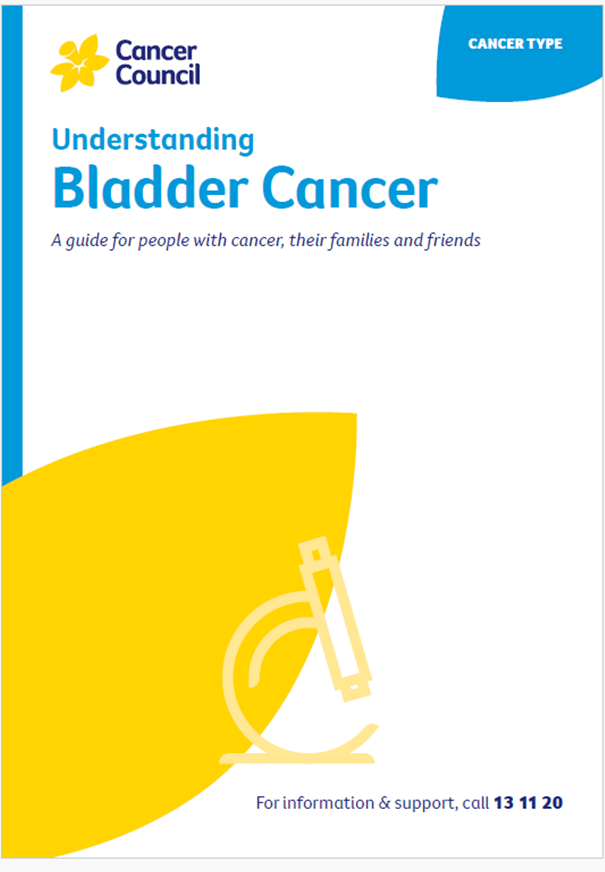- Home
- Bladder cancer
- Life after treatment
Life after treatment for bladder cancer
For most people, the cancer experience doesn’t end on the last day of treatment. Life after cancer treatment can present its own challenges. You may have mixed feelings when treatment ends, and worry that every ache and pain means the cancer is coming back.
Learn more about:
- Overview
- Follow-up appointments
- Dealing with feelings of sadness
- Looking after yourself
- If bladder cancer returns
Overview
Some people say that they feel pressure to return to “normal life”. It is important to allow yourself time to adjust to the physical and emotional changes, and establish a new daily routine at your own pace. Your family and friends may also need time to adjust.
Cancer Council 13 11 20 can help you connect with other people who have had bladder cancer, and provide you with information about the emotional and practical aspects of living well after cancer.
For more on this, see Living well after cancer.
Follow-up appointments
If there are no signs of cancer after treatment ends, you will have regular appointments to monitor your health, manage any ongoing side effects and check that the cancer hasn’t come back or spread.
How often you see your doctor will depend on the type of bladder cancer and treatments. During the check-ups, you can discuss how you’re feeling and mention any concerns, and you may have tests such as CT scans and x-rays.
People who still have a bladder will have regular follow-up cystoscopies because this is the best way to find bladder cancer that has come back. The cystoscopy may be done in hospital in the outpatient department under local anaesthetic or in an operating theatre under general anaesthetic. Depending on the stage and grade of the bladder cancer you had, you will need a follow-up cystoscopy every 3–12 months.
This may continue for several years or for the rest of your life, but will become less frequent over time. Between follow-up appointments, let your doctor know immediately of any symptoms or health problems.
Dealing with feelings of sadness
If you have continued feelings of sadness, have trouble getting up in the morning or have lost motivation to do things that previously gave you pleasure, you may be experiencing depression. This is quite common among people who have had cancer.
Talk to your GP, because counselling or medication – even for a short time – may help. Some people can get a Medicare rebate for sessions with a psychologist. Cancer Council may also run a counselling program in your area.
For information about coping with depression and anxiety, call Beyond Blue on 1300 22 4636. For 24-hour crisis support, call Lifeline 13 11 14.
Cancer webinars
Watch our cancer webinars for information and insights that can help with the challenges you may face now that treatment is finished.
Looking after yourself
Cancer can cause physical and emotional strain, so it’s important to look after your wellbeing. Cancer Council has free booklets and programs to help you during and after treatment.
Call 13 11 20 to find out more, or see Managing cancer side effects, Exercise after a cancer diagnosis, Complementary therapies, Emotions and cancer, Nutrition and cancer, Sexuality, intimacy and cancer, Fertility and cancer, and Living well after cancer.
Alternative therapies are therapies used instead of conventional medical treatments. These are unlikely to be scientifically tested, may prevent successful treatment of the cancer and can be harmful. Cancer Council does not recommend the use of alternative therapies as a cancer treatment.
If bladder cancer returns
Sometimes bladder cancer does come back after treatment (known as a recurrence). If the cancer recurs and you still have a bladder, the cancer can usually be removed while it is still in the early stages. This will require a cystoscopy under general anaesthetic. If this isn’t possible, your doctor may consider removal of the bladder (cystectomy).
Some people need other types of treatment, such as systemic chemotherapy, immunotherapy or radiation therapy. The treatment you have will depend on the stage, grade and risk category of the cancer, your previous treatment and your preferences.
→ READ MORE: Personal stories from people affected by bladder cancer
Watch this video to see why eating well is so important after a cancer diagnosis, and what you can do to maintain a healthy diet.
Research shows that exercise benefits people with cancer during and after treatment. Find out more in this video or see our other exercise videos.
More resources
Dr Prassannah Satasivam, Urologist and Robotic Surgeon, Epworth Hospitals and Cabrini Hospitals, VIC; Donna Clifford, Urology Nurse Practitioner, Royal Adelaide Hospital, SA; Marc Diocera, Genitourinary Nurse Consultant, Peter MacCallum Cancer Centre, VIC; Dr Renee Finnigan, Radiation Oncologist, Gold Coast University Hospital, QLD; Lisa Hann, 13 11 20 Consultant, Cancer Council SA; Dr Andrew Hirschhorn, Director of Allied Health and MQ Health Academy, MQ Health, Macquarie University, NSW; Anne Marie Lyons, Stomal Therapy Nurse, Concord Hospital and NSW Stoma Limited, NSW; John McDonald, Consumer; Prof Manish Patel, Urological Cancer and Robotic Surgeon, Westmead Hospital, Macquarie University Hospital, and The University of Sydney, NSW; Dr Jason Paterdis, Urological Surgeon, Brisbane Urology Clinic, QLD; Graeme Sissing, Consumer; Prof Martin Stockler, Medical Oncologist, The University of Sydney, Concord Cancer Centre, and Chris O’Brien Lifehouse RPA, NSW.
View the Cancer Council NSW editorial policy.
View all publications or call 13 11 20 for free printed copies.

